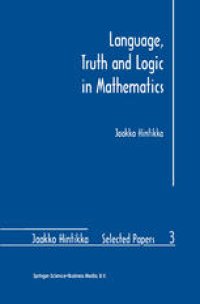
Ebook: Language, Truth and Logic in Mathematics
Author: Jaakko Hintikka (auth.)
- Tags: Mathematical Logic and Foundations, Logic, History of Mathematical Sciences
- Series: Jaakko Hintikka Selected Papers 3
- Year: 1998
- Publisher: Springer Netherlands
- Edition: 1
- Language: English
- pdf
One can distinguish, roughly speaking, two different approaches to the philosophy of mathematics. On the one hand, some philosophers (and some mathematicians) take the nature and the results of mathematicians' activities as given, and go on to ask what philosophical morals one might perhaps find in their story. On the other hand, some philosophers, logicians and mathematicians have tried or are trying to subject the very concepts which mathematicians are using in their work to critical scrutiny. In practice this usually means scrutinizing the logical and linguistic tools mathematicians wield. Such scrutiny can scarcely help relying on philosophical ideas and principles. In other words it can scarcely help being literally a study of language, truth and logic in mathematics, albeit not necessarily in the spirit of AJ. Ayer. As its title indicates, the essays included in the present volume represent the latter approach. In most of them one of the fundamental concepts in the foundations of mathematics and logic is subjected to a scrutiny from a largely novel point of view. Typically, it turns out that the concept in question is in need of a revision or reconsideration or at least can be given a new twist. The results of such a re-examination are not primarily critical, however, but typically open up new constructive possibilities. The consequences of such deconstructions and reconstructions are often quite sweeping, and are explored in the same paper or in others.
The foundations of mathematics are examined by reference to such crucial concepts as the informational independence of quantifiers, the standard-nonstandard distinction, completeness, computability, parallel processing and the extremality of models.
The foundations of mathematics are examined by reference to such crucial concepts as the informational independence of quantifiers, the standard-nonstandard distinction, completeness, computability, parallel processing and the extremality of models.
Content:
Front Matter....Pages i-x
What is Elementary Logic? Independence-Friendly Logic as the True Core Area of Logic....Pages 1-26
A Revolution in Logic?....Pages 27-44
A Revolution in the Foundations of Mathematics?....Pages 45-61
Is there Completeness in Mathematics after G?del?....Pages 62-83
Hilbert Vindicated?....Pages 84-105
Standard vs. Nonstandard Distinction: A Watershed in the Foundations of Mathematics....Pages 106-129
Standard vs. Nonstandard Logic: Higher-Order, Modal, and First-Order Logics....Pages 130-143
The Skeleton in Frege’s Cupboard: The Standard Versus Nonstandard Distinction....Pages 144-173
An Alternative Concept of Computability....Pages 174-188
What is the Logic of Parallel Processing?....Pages 189-211
Model Minimization — An Alternative to Circumscription....Pages 212-224
New Foundations for Mathematical Theories....Pages 225-247
Back Matter....Pages 249-249
The foundations of mathematics are examined by reference to such crucial concepts as the informational independence of quantifiers, the standard-nonstandard distinction, completeness, computability, parallel processing and the extremality of models.
Content:
Front Matter....Pages i-x
What is Elementary Logic? Independence-Friendly Logic as the True Core Area of Logic....Pages 1-26
A Revolution in Logic?....Pages 27-44
A Revolution in the Foundations of Mathematics?....Pages 45-61
Is there Completeness in Mathematics after G?del?....Pages 62-83
Hilbert Vindicated?....Pages 84-105
Standard vs. Nonstandard Distinction: A Watershed in the Foundations of Mathematics....Pages 106-129
Standard vs. Nonstandard Logic: Higher-Order, Modal, and First-Order Logics....Pages 130-143
The Skeleton in Frege’s Cupboard: The Standard Versus Nonstandard Distinction....Pages 144-173
An Alternative Concept of Computability....Pages 174-188
What is the Logic of Parallel Processing?....Pages 189-211
Model Minimization — An Alternative to Circumscription....Pages 212-224
New Foundations for Mathematical Theories....Pages 225-247
Back Matter....Pages 249-249
....